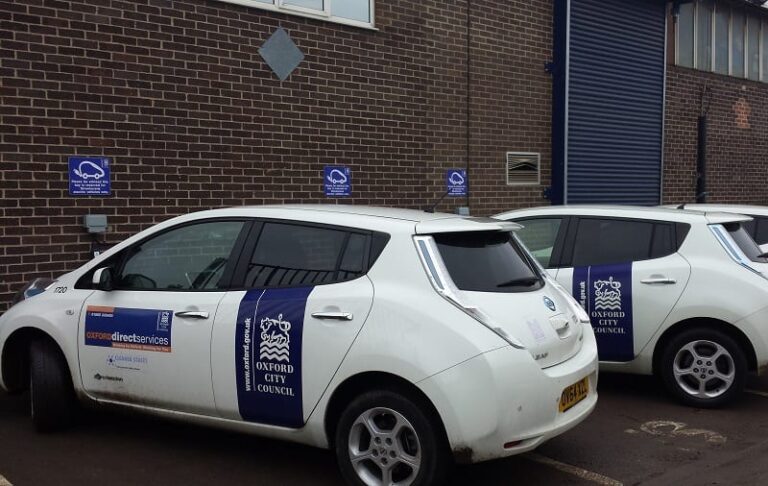Oxford City Council has taken delivery of its first EVs as part of a project to lower the city’s carbon emissions and improve its air quality.
The council’s wholly-owned company, Oxford Direct Services, has added six new EVs to its current fleet, with a further 27 – including cars, a street sweeper, excavator, and mix of different sized vans – due to be delivered over the next 3-4 months.
The council said it aims to electrify 25% of its 330 fleet by 2023.
The vehicles have been funded by Energy Superhub Oxford (ESO), a 3-year £41m project that aims to showcase an integrated approach to decarbonising power, heat and transport across the city.
ESO was announced last year and has received £10m from the UK government’s Prospering from the Energy Revolution Challenge.
It is led by Oxford City Council and EDF Renewables UK company Pivot Power, and includes Habitat Energy, Invinity Energy Systems, Kensa Contracting and the University of Oxford.

The project is enabling the council to evaluate its existing fleet and assess its strategy for electrification based on usage, range, emissions, costs and suitable electric replacement.
ESO is also funding a ‘try before you buy’ scheme for Oxford’s Hackney Carriage drivers with Electric Blue, which aims to encourage and accelerate the switch to zero-emission capable Hackney Carriage vehicles.
The scheme enables drivers to trial one of two models – an all-electric Nissan Dynamo or an LEVC plug-in hybrid taxi – for a two- or four-week period.
Two hybrid-electric LEVC taxis are already operating in Oxford, with two more expected on the road soon.
From 2025 drivers in Oxford will only be able to get a licence if they have a zero-emission capable cab.
To support the city’s switch to EVs, Pivot Power is installing what it describes as “the world’s most powerful charging network”, delivering up to 25MW of power via an 8km private wire network around the south of Oxford.
The network will connect public charging facilities at Redbridge Park & Ride directly to National Grid’s high-voltage transmission network.
According to Pivot Power, the network has capacity to expand with EV adoption and provide power for local businesses seeking to electrify their fleets..
The Park & Ride EV public Superhub aims to include 20 charge points ranging from rapid (50kW+) to ultra-rapid (150kW+), capable of charging a car in 15-50 minutes, and 30 fast charge points (minimum 7kW), which can charge a car over a period of hours.
Pivot Power is also developing what it calls “the world’s largest ever hybrid energy storage system”, comprising a 50MW lithium-ion battery and a 2MW vanadium redox flow battery, supplied by Invinity Energy Systems, which will share the grid connection with the private wire network.

Furthermore, machine learning technology from Habitat Energy will optimise the system and help balance the grid by enabling greater use of clean, renewable energy sources, while carrying out trading on the day ahead, intraday and balancing mechanism markets.
It will also predict overall demand on the private wire network to support the management of future fleet charging.
Councillor Tom Hayes, cabinet member for Zero Carbon Oxford, Oxford City Council, said: “With this project we’re encouraging the adoption of electric vehicles and move to zero carbon.
“Energy Superhub Oxford gives Oxford strengths that no other city currently has: the world’s most powerful charging network and the world’s largest ever hybrid battery, and as a result we can accelerate our electric vehicle charging infrastructure for businesses and residents.
“It also allows the city council to provide support on top of what we’re already offering to Hackney Carriage taxi drivers looking to move to electric.
“I am looking forward to seeing this project accelerate Oxford towards zero.”
To assess the impacts of the project the University of Oxford is building a computer model for large-scale batteries, able to simulate the behaviour of thousands of cells simultaneously.
Once the battery is operational, the model will be matched to the measured data, with insights used to improve the system’s performance.
Want to read more stories like this?
Oxford takes delivery of first electric open-top double decker bus
Oxford reveals plan for UK’s first city-centre Zero Emission Zone
Oxford trialling new automated parking payment system
Oxford trials world’s first retractable on-street EV chargers





